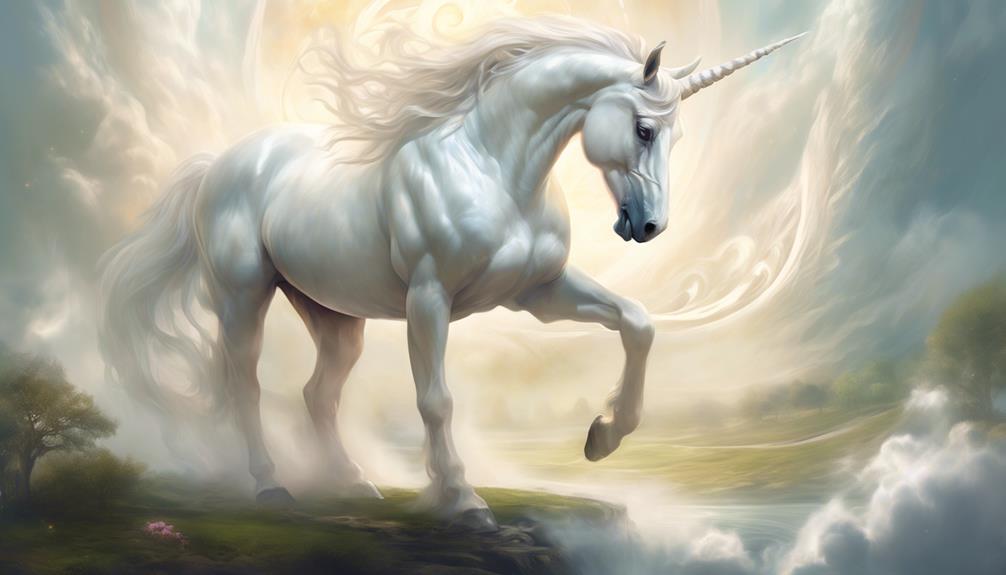In the book of Job, there is a passage that mentions unicorns, describing them as creatures of great strength and power, with one or two strong horns.
The debate surrounding the biblical portrayal of unicorns has intrigued scholars and theologians for centuries. While some view the unicorn as a mythical symbol, others seek to identify it as a real creature from ancient times. However, the exact nature of the biblical unicorn remains shrouded in mystery.
As the discussion unfolds, one is left to wonder about the symbolism and significance behind this enigmatic creature, prompting a deeper exploration into the intersection of mythology, biblical interpretation, and historical context.
Biblical References to Unicorns
The biblical references to unicorns provide insight into the ancient understanding of these enigmatic creatures and their place within the natural world. In the Bible, the unicorn is depicted as a creature of great strength, mentioned alongside other well-known animals. For instance, in Job 39:9-12, the unicorn is described as powerful but unwilling to serve humans or plow the fields.
The unicorn is mentioned in several Old Testament books, including Numbers, Deuteronomy, and Psalms. The Hebrew word 'reem' is translated as a one-horned animal in the King James Version, Luther's German Bible, the Septuagint, and the Latin Vulgate. This translation has sparked debates about the actual identity of the animal referred to as the unicorn in the Bible, with some suggesting it could have been an aurochs, a type of wild ox known as the rimu to the Assyrians.
Interpretations and Debates
Frequently debated by scholars and theologians, the biblical references to unicorns have sparked a wide range of interpretations and discussions about the identity and nature of this enigmatic creature.
The debate primarily centers around the Hebrew word 're'em,' which is often translated as 'unicorn' in the King James Version of the Bible. Modern translations, however, tend to use terms such as 'wild ox' or 'aurochs' instead.
Some scholars argue that the term might refer to an extinct species of wild ox, while others propose that it could be a reference to mythical or metaphorical creatures. Eyewitness accounts of fierce, one-horned animals may have influenced the original Hebrew word choice.
The debate continues to be a topic of interest in Bible study, emphasizing that interpretations of ancient texts in the modern world shouldn't cause discord.
Unicorns in Ancient Mythology
Interpreting the biblical references to unicorns has sparked numerous debates among scholars and theologians, and this debate continues as we pivot to explore the role of unicorns in ancient mythology.
The unicorn's mention in the Bible alongside familiar animals underlines its significance in ancient mythology. Described as a powerful, untamable creature with a strong horn in the Old Testament, the unicorn symbolized strength and agility, skipping like calves and traveling like bullocks.
Ancient rock drawings and eyewitness accounts of fierce, single-horned equine-like animals in southern Africa provide intriguing evidence of the existence of unicorns in ancient mythology.
Linguistic analyses of words like 'rimu' and 'reem' in various ancient languages suggest the biblical unicorn's possible association with wild bulls, buffaloes, or antelopes, shedding light on the unicorn's role in ancient mythology, which continues to fascinate the modern world.
Symbolism and Significance
Symbolism and significance intertwine in the biblical portrayal of the unicorn, embodying the divine attributes of strength and majesty. The unicorn, mentioned in various versions of the Bible, is often depicted as a wild and untamable creature, symbolizing the power and might of God's creation.
While the specific identity of the biblical unicorn is a topic of debate, its representation as a creature with a strong horn underscores its symbolism of strength. Eyewitness accounts, ancient rock drawings, and thousands of years of history in southern Africa further emphasize the significance of the unicorn as a real, powerful creature.
Understanding the biblical unicorn as a symbol of strength, rather than a mythical being, reinforces the majestic nature of God's creation and His omnipotent presence, as described in the Bible.
Unraveling the Mystery
The identity of the biblical unicorn has been a subject of uncertainty and intrigue, leading to various interpretations and attempts to unravel the mystery surrounding this enigmatic creature.
Described in the Bible as a powerful animal with great strength, the unicorn's one or two strong horns symbolize its formidable nature.
Reports from the 18th century in southern Africa and the existence of the elasmotherium, a giant rhinoceros, provide possible evidence for the unicorn's identity. Additionally, rock drawings in southern Africa depict an animal resembling the biblical unicorn, suggesting that it may have once roamed the earth.
While unicorns are uncommon in the modern world, their past existence can't be dismissed.
The mystery of the unicorn's identity continues to captivate scholars and enthusiasts alike, as they seek to uncover the truth behind this captivating creature.
Frequently Asked Questions
What Does the Unicorn Mean in Christianity?
The unicorn in Christian symbolism represents strength, purity, and untamed power. Its allegorical meaning lies in its biblical references as a symbol of God's strength and glory, offering a spiritual significance from a theological perspective.
What Does Unicorn Mean in the Hebrew Bible?
In the Hebrew Bible, unicorn symbolism reflects biblical interpretation and cultural significance. Ancient references, linguistic analysis, and historical context shape the understanding of mythical creatures as symbolic animals in biblical imagery, influencing biblical translation.
What Mythical Creatures Are Mentioned in the Bible?
Mythical beasts, biblical creatures, and ancient symbols are mentioned in the Bible, often interpreted through Christian perspectives. These references symbolize various ideas and beliefs, contributing to the rich tapestry of religious and mythological symbolism.
What Is Psalms 92 10?
Psalms 92:10 discusses the strength and vitality bestowed upon the righteous. It's often interpreted metaphorically, symbolizing the flourishing of those who follow God. The mention of unicorns in the Bible is a topic of debate among scholars and theologians.

